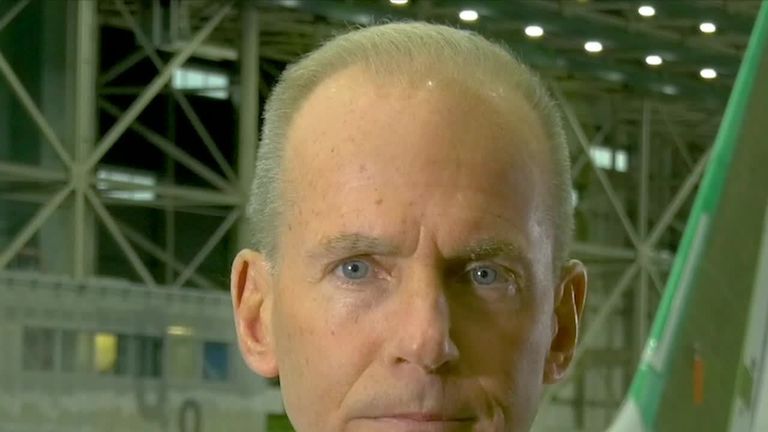Boeing boss should have stepped down months ago
The company has until now insisted on not supplying a fall guy in the wake of two deadly crashes involving the 737 MAX.
Monday 23 December 2019 17:28, UK
The only real surprise about the departure of Dennis Muilenburg from Boeing is how long it took to happen.
Boeing's handling of the 737 MAX debacle has been abject.
The hallmark of this has been that Mr Muilenburg, despite being stripped of his chairmanship of Boeing in October, had remained in place as chief executive.
That mulish insistence on not supplying a fall guy was thrown into stark relief when, in November, another household name from corporate America showed its chief executive the door.
Steve Easterbrook's exit from McDonald's, for the comparatively trivial offence of having a consensual relationship with a workplace colleague, was contrasted with Boeing's decision not to remove a chief executive at the helm when 346 people were killed in two crashes involving its aircraft.
It had become apparent, during recent weeks, that the company's investors had run out of patience.
The final straw came when, last week, Boeing suspended production of the 737 MAX.
This was seen as a nuclear option because, ever since the aircraft was grounded in March this year, Boeing had insisted it would be less costly and disruptive to continue manufacturing the aircraft and storing them rather than suspending production altogether.
So that decision was a clear signal to the outside world that things were badly wrong.
Continuing to build and store new aircraft each month was reckoned to be costing the firm some $4.4bn (£3.4bn) every three months.
Boeing has so far set aside some $10bn in total to cover the higher production and storage costs and compensating airlines, including Ryanair and Norwegian, that had placed orders for the aircraft that have not yet been fulfilled.
Shareholders were also antagonised when, for the first time in eight years, Boeing failed to increase its dividend - a payout described by one Wall Street analyst recently as "sacred".
:: Boeing chief ousted days after announcing 737 MAX production to be grounded
Mistakes were made right from the outset.
After the crashes involving the 737 MAX, a Lion Air flight in Indonesia in October last year and an Ethiopian Airlines flight in March this year, both Mr Muilenberg and Boeing insisted the aircraft was safe despite evidence emerging of problems with its software.
Although Mr Muilenburg offered a number of apologies to the families of those killed in the two disasters, his dogged defence of the aircraft did neither him or Boeing any favours.
The company came across as unfeeling and arrogant.
These errors were then compounded by Boeing's regular insistence that the aircraft would be airborne again before too long.
Boeing's assurances, all the way through the spring and summer, that the aircraft would be in the skies again by November or December allowed the impression to be created that it was in charge of events.
This antagonised the regulator, the Federal Aviation Administration, which in recent weeks has publicly slapped down Boeing for trying to hurry it along and accused it of setting unrealistic expectations as to when the planes would fly again.
The FAA was also infuriated by a failure, on Boeing's part, to keep it properly informed on updates being made to the 737 MAX's flight software.
The FAA's patience ran out when, last month, Steve Dickson, the FAA's new boss, summoned Mr Muilenburg to a meeting in Washington for a dressing-down.
Aviation industry regulators elsewhere around the world were similarly irritated.
Further embarrassment for Boeing came when, last Friday, the first test flight of Boeing's Starliner space capsule ran into difficulties.
It prompted Boeing's chairman Dave Calhoun, who was today confirmed as Mr Muilenburg's replacement as chief executive, into issuing a statement giving Mr Muilenburg the board's backing.
What appears to have changed, over the weekend, is that Boeing's shareholders told the company that it had to change its chief executive.
Boeing's statement today, confirming Mr Muilenburg's departure, acknowledged that it has not handled the affair well.
It said: "The board of directors decided that a change in leadership was necessary to restore confidence in the company moving forward as it works to repair relationships with regulators, customers, and all other stakeholders.
"Under the company's new leadership, Boeing will operate with a renewed commitment to full transparency, including effective and proactive communication with the FAA, other global regulators and its customers."
That Mr Muilenburg continued to be in place was starting to damage Boeing - as has been shown by the fact that its shares have risen by nearly 3% on news of his departure.
The rally - Boeing's shares have fallen by nearly a quarter since March - may also reflect that Boeing is finally, belatedly, recognising the mistakes it has made and its need to change.
The appointment of Mr Calhoun, who previously was working at the private equity giant Blackstone Group, will bring a fresh pair of eyes to Boeing.
But aerospace analysts are already questioning whether Mr Calhoun, despite his industry experience, is the ideal long-term replacement to a man who first joined Boeing as an intern in 1985.
There have also been calls for Boeing to reverse its decision, made in 2001, to move its headquarters from Seattle to Chicago.
Mr Muilenburg should have stepped down months ago.
His continued occupation of the chief executive's office was distracting from Boeing's attempt to rebuild relationships with its customers, its shareholders and its regulator.
His departure is the first step on the road to recovery.







